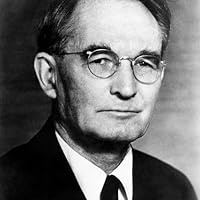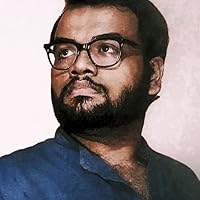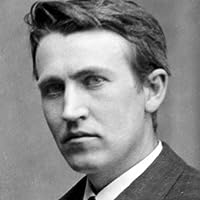Edison Quotes
Quotes tagged as "edison"
Showing 1-14 of 15

“His [Thomas Edison] method was inefficient in the extreme, for an immense ground had to be covered to get anything at all unless blind chance intervened and, at first, I was almost a sorry witness of his doings, knowing that just a little theory and calculation would have saved him 90 per cent of the labor. But he had a veritable contempt for book learning and mathematical knowledge, trusting himself entirely to his inventor's instinct and practical American sense. In view of this, the truly prodigious amount of his actual accomplishments is little short of a miracle.”
―
―

“If he [Thomas Edison] had a needle to find in a haystack, he would not stop to reason where it was most likely to be, but would proceed at once with the feverish diligence of a bee, to examine straw after straw until he found the object of his search. … Just a little theory and calculation would have saved him ninety percent of his labor.”
―
―

“I came from Paris in the Spring of 1884, and was brought in intimate contact with him [Thomas Edison]. We experimented day and night, holidays not excepted. His existence was made up of alternate periods of work and sleep in the laboratory. He had no hobby, cared for no sport or amusement of any kind and lived in utter disregard of the most elementary rules of hygiene. There can be no doubt that, if he had not married later a woman of exceptional intelligence, who made it the one object of her life to preserve him, he would have died many years ago from consequences of sheer neglect. So great and uncontrollable was his passion for work.”
―
―

“Edison was by far the most successful and, probably, the last exponent of the purely empirical method of investigation. Everything he achieved was the result of persistent trials and experiments often performed at random but always attesting extraordinary vigor and resource. Starting from a few known elements, he would make their combinations and permutations, tabulate them and run through the whole list, completing test after test with incredible rapidity until he obtained a clue. His mind was dominated by one idea, to leave no stone unturned, to exhaust every possibility.”
―
―

“The attitude which the man in the street unconsciously adopts towards science is capricious and varied. At one moment he scorns the scientist for a highbrow, at another anathematizes him for blasphemously undermining his religion; but at the mention of a name like Edison he falls into a coma of veneration. When he stops to think, he does recognize, however, that the whole atmosphere of the world in which he lives is tinged by science, as is shown most immediately and strikingly by our modern conveniences and material resources. A little deeper thinking shows him that the influence of science goes much farther and colors the entire mental outlook of modern civilised man on the world about him.”
― Reflections of a Physicist
― Reflections of a Physicist

“The recurrence of a phenomenon like [Thomas] Edison is not very likely. The profound change of conditions and the ever increasing necessity of theoretical training would seem to make it impossible. He will occupy a unique and exalted position in the history of his native land, which might well be proud of his great genius and undying achievements in the interest of humanity.”
―
―
“{From Luther Burbank's funeral. He was loved until he revealed he was an atheist, then he began to receive death threats. He tried to amiably answer them all, leading to his death}
It is impossible to estimate the wealth he has created. It has been generously given to the world. Unlike inventors, in other fields, no patent rights were given him, nor did he seek a monopoly in what he created. Had that been the case, Luther Burbank would have been perhaps the world's richest man. But the world is richer because of him. In this he found joy that no amount of money could give.
And so we meet him here today, not in death, but in the only immortal life we positively know--his good deeds, his kindly, simple, life of constructive work and loving service to the whole wide world.
These things cannot die. They are cumulative, and the work he has done shall be as nothing to its continuation in the only immortality this brave, unselfish man ever sought, or asked to know.
As great as were his contributions to the material wealth of this planet, the ages yet to come, that shall better understand him, will give first place in judging the importance of his work to what he has done for the betterment of human plants and the strength they shall gain, through his courage, to conquer the tares, the thistles and the weeds. Then no more shall we have a mythical God that smells of brimstone and fire; that confuses hate with love; a God that binds up the minds of little children, as other heathen bind up their feet--little children equally helpless to defend their precious right to think and choose and not be chained from the dawn of childhood to the dogmas of the dead.
Luther Burbank will rank with the great leaders who have driven heathenish gods back into darkness, forever from this earth.
In the orthodox threat of eternal punishment for sin--which he knew was often synonymous with yielding up all liberty and freedom--and in its promise of an immortality, often held out for the sacrifice of all that was dear to life, the right to think, the right to one's mind, the right to choose, he saw nothing but cowardice. He shrank from such ways of thought as a flower from the icy blasts of death. As shown by his work in life, contributing billions of wealth to humanity, with no more return than the maintenance of his own breadline, he was too humble, too unselfish, to be cajoled with dogmatic promises of rewards as a sort of heavenly bribe for righteous conduct here. He knew that the man who fearlessly stands for the right, regardless of the threat of punishment or the promise of reward, was the real man.
Rather was he willing to accept eternal sleep, in returning to the elements from whence he came, for in his lexicon change was life. Here he was content to mingle as a part of the whole, as the raindrop from the sea performs its sacred service in watering the land to which it is assigned, that two blades may grow instead of one, and then, its mission ended, goes back to the ocean from whence it came. With such service, with such a life as gardener to the lilies of the field, in his return to the bosoms of infinity, he has not lost himself. There he has found himself, is a part of the cosmic sea of eternal force, eternal energy. And thus he lived and always will live.
Thomas Edison, who believes very much as Burbank, once discussed with me immortality. He pointed to the electric light, his invention, saying: 'There lives Tom Edison.' So Luther Burbank lives. He lives forever in the myriad fields of strengthened grain, in the new forms of fruits and flowers, plants, vines, and trees, and above all, the newly watered gardens of the human mind, from whence shall spring human freedom that shall drive out false and brutal gods. The gods are toppling from their thrones. They go before the laughter and the joy of the new childhood of the race, unshackled and unafraid.”
―
It is impossible to estimate the wealth he has created. It has been generously given to the world. Unlike inventors, in other fields, no patent rights were given him, nor did he seek a monopoly in what he created. Had that been the case, Luther Burbank would have been perhaps the world's richest man. But the world is richer because of him. In this he found joy that no amount of money could give.
And so we meet him here today, not in death, but in the only immortal life we positively know--his good deeds, his kindly, simple, life of constructive work and loving service to the whole wide world.
These things cannot die. They are cumulative, and the work he has done shall be as nothing to its continuation in the only immortality this brave, unselfish man ever sought, or asked to know.
As great as were his contributions to the material wealth of this planet, the ages yet to come, that shall better understand him, will give first place in judging the importance of his work to what he has done for the betterment of human plants and the strength they shall gain, through his courage, to conquer the tares, the thistles and the weeds. Then no more shall we have a mythical God that smells of brimstone and fire; that confuses hate with love; a God that binds up the minds of little children, as other heathen bind up their feet--little children equally helpless to defend their precious right to think and choose and not be chained from the dawn of childhood to the dogmas of the dead.
Luther Burbank will rank with the great leaders who have driven heathenish gods back into darkness, forever from this earth.
In the orthodox threat of eternal punishment for sin--which he knew was often synonymous with yielding up all liberty and freedom--and in its promise of an immortality, often held out for the sacrifice of all that was dear to life, the right to think, the right to one's mind, the right to choose, he saw nothing but cowardice. He shrank from such ways of thought as a flower from the icy blasts of death. As shown by his work in life, contributing billions of wealth to humanity, with no more return than the maintenance of his own breadline, he was too humble, too unselfish, to be cajoled with dogmatic promises of rewards as a sort of heavenly bribe for righteous conduct here. He knew that the man who fearlessly stands for the right, regardless of the threat of punishment or the promise of reward, was the real man.
Rather was he willing to accept eternal sleep, in returning to the elements from whence he came, for in his lexicon change was life. Here he was content to mingle as a part of the whole, as the raindrop from the sea performs its sacred service in watering the land to which it is assigned, that two blades may grow instead of one, and then, its mission ended, goes back to the ocean from whence it came. With such service, with such a life as gardener to the lilies of the field, in his return to the bosoms of infinity, he has not lost himself. There he has found himself, is a part of the cosmic sea of eternal force, eternal energy. And thus he lived and always will live.
Thomas Edison, who believes very much as Burbank, once discussed with me immortality. He pointed to the electric light, his invention, saying: 'There lives Tom Edison.' So Luther Burbank lives. He lives forever in the myriad fields of strengthened grain, in the new forms of fruits and flowers, plants, vines, and trees, and above all, the newly watered gardens of the human mind, from whence shall spring human freedom that shall drive out false and brutal gods. The gods are toppling from their thrones. They go before the laughter and the joy of the new childhood of the race, unshackled and unafraid.”
―

“Bitter? Nah. Parafrazandu-l pe Edison, n-am esuat la “the dating game”, doar am gasit 10.000 de femei care nu merg.”
― Viata mea
― Viata mea
“I remember on one of my many visits with Thomas A. Edison, I brought up the question of Ingersoll. I asked this great genius what he thought of him, and he replied, 'He was grand.' I told Mr. Edison that I had been invited to deliver a radio address on Ingersoll, and would he be kind enough to write me a short appreciation of him. This he did, and a photostat of that letter is now a part of this house. In it you will read what Mr. Edison wrote. He said: 'I think that Ingersoll had all the attributes of a perfect man, and, in my opinion, no finer personality ever existed....'
I mention this as an indication of the tremendous influence Ingersoll had upon the intellectual life of his time. To what extent did Ingersoll influence Edison?
It was Thomas A. Edison's freedom from the narrow boundaries of theological dogma, and his thorough emancipation from the degrading and stultifying creed of Christianity, that made it possible for him to wrest from nature her most cherished secrets, and bequeath to the human race the richest of legacies.
Mr. Edison told me that when Ingersoll visited his laboratories, he made a record of his voice, but stated that the reproductive devices of that time were not as good as those later developed, and, therefore, his magnificent voice was lost to posterity.”
― Ingersoll the Magnificent
I mention this as an indication of the tremendous influence Ingersoll had upon the intellectual life of his time. To what extent did Ingersoll influence Edison?
It was Thomas A. Edison's freedom from the narrow boundaries of theological dogma, and his thorough emancipation from the degrading and stultifying creed of Christianity, that made it possible for him to wrest from nature her most cherished secrets, and bequeath to the human race the richest of legacies.
Mr. Edison told me that when Ingersoll visited his laboratories, he made a record of his voice, but stated that the reproductive devices of that time were not as good as those later developed, and, therefore, his magnificent voice was lost to posterity.”
― Ingersoll the Magnificent
“Un hombre rubio que rondaría los treinta y cinco años se atrevió a preguntarle a José: —Yo nunca fui a la escuela. En Bailén era labrador y solo entiendo de olivos. ¿Crees de verdad que sería capaz de aprender? —Thomas Edison desarrolló la primera central eléctrica, la lámpara de incandescencia y el primer ferrocarril eléctrico. Patentó más de mil inventos. ¿Sabes cuánto tiempo fue a la escuela?
Los hombres miraron expectantes a José, esperando su respuesta. Él se tomó su tiempo y notó cómo la impaciencia crecía entre los reclusos que, vestidos con sus uniformes a rayas, se encontraban a su alrededor. —Aquel hombre solo estuvo tres meses en el colegio. Imaginaos qué podríamos descubrir nosotros en diez años. (pp. 264-265)”
― Tres cipreses: Novela
Los hombres miraron expectantes a José, esperando su respuesta. Él se tomó su tiempo y notó cómo la impaciencia crecía entre los reclusos que, vestidos con sus uniformes a rayas, se encontraban a su alrededor. —Aquel hombre solo estuvo tres meses en el colegio. Imaginaos qué podríamos descubrir nosotros en diez años. (pp. 264-265)”
― Tres cipreses: Novela
“Thomas Edison was no an inventor but a very evil wealthy man with connections to the most wealthy Americans. He killed animals in order to demonize Nikola Tesla, the greatest inventor in human history. However, you will never learn about Tesla in any school system because he never wanted to be wealthy and his inventions were for the purpose of helping mankind. When JP Morgan, one of the most evil wealthy men in America, found out that Tesla wanted to give every human in the world free electricity, he stopped paying him and destroyed his invention to supply that free electricity. This is why you'll never learn about Tesla in the public school system.”
―
―

“Genius is 1% inspiration and 99% perspiration - said the genius who was 1% showman and 99% fraud.”
― Bulletproof Backbone: Injustice Not Allowed on My Watch
― Bulletproof Backbone: Injustice Not Allowed on My Watch
All Quotes
|
My Quotes
|
Add A Quote
Browse By Tag
- Love Quotes 97.5k
- Life Quotes 76k
- Inspirational Quotes 73k
- Humor Quotes 43.5k
- Philosophy Quotes 29.5k
- Inspirational Quotes Quotes 27k
- God Quotes 26k
- Truth Quotes 23.5k
- Wisdom Quotes 23.5k
- Romance Quotes 23k
- Poetry Quotes 22k
- Death Quotes 20k
- Happiness Quotes 18.5k
- Life Lessons Quotes 18.5k
- Hope Quotes 18k
- Faith Quotes 18k
- Quotes Quotes 16.5k
- Inspiration Quotes 16.5k
- Spirituality Quotes 15k
- Religion Quotes 15k
- Motivational Quotes 15k
- Writing Quotes 15k
- Relationships Quotes 14.5k
- Life Quotes Quotes 14k
- Love Quotes Quotes 14k
- Success Quotes 13.5k
- Time Quotes 12.5k
- Motivation Quotes 12k
- Science Quotes 11.5k
- Motivational Quotes Quotes 11.5k


